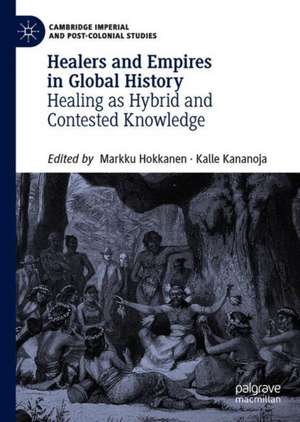Healers and Empires in Global History: Healing as Hybrid and Contested Knowledge: Cambridge Imperial and Post-Colonial Studies
Editat de Markku Hokkanen, Kalle Kananojaen Limba Engleză Hardback – 2 mai 2019
Din seria Cambridge Imperial and Post-Colonial Studies
- 23%
 Preț: 637.33 lei
Preț: 637.33 lei - 18%
 Preț: 894.46 lei
Preț: 894.46 lei - 18%
 Preț: 733.78 lei
Preț: 733.78 lei - 17%
 Preț: 491.68 lei
Preț: 491.68 lei -
 Preț: 196.85 lei
Preț: 196.85 lei - 18%
 Preț: 774.83 lei
Preț: 774.83 lei -
 Preț: 381.21 lei
Preț: 381.21 lei -
 Preț: 280.10 lei
Preț: 280.10 lei -
 Preț: 397.08 lei
Preț: 397.08 lei - 20%
 Preț: 755.46 lei
Preț: 755.46 lei -
 Preț: 386.10 lei
Preț: 386.10 lei -
 Preț: 389.70 lei
Preț: 389.70 lei - 18%
 Preț: 782.87 lei
Preț: 782.87 lei - 15%
 Preț: 644.18 lei
Preț: 644.18 lei - 15%
 Preț: 500.73 lei
Preț: 500.73 lei - 15%
 Preț: 640.37 lei
Preț: 640.37 lei -
 Preț: 396.40 lei
Preț: 396.40 lei -
 Preț: 390.63 lei
Preț: 390.63 lei - 15%
 Preț: 642.03 lei
Preț: 642.03 lei -
 Preț: 387.96 lei
Preț: 387.96 lei -
 Preț: 385.47 lei
Preț: 385.47 lei - 15%
 Preț: 640.37 lei
Preț: 640.37 lei -
 Preț: 390.63 lei
Preț: 390.63 lei -
 Preț: 389.88 lei
Preț: 389.88 lei -
 Preț: 385.08 lei
Preț: 385.08 lei - 15%
 Preț: 641.20 lei
Preț: 641.20 lei -
 Preț: 393.52 lei
Preț: 393.52 lei -
 Preț: 390.63 lei
Preț: 390.63 lei -
 Preț: 457.80 lei
Preț: 457.80 lei - 18%
 Preț: 1000.56 lei
Preț: 1000.56 lei - 15%
 Preț: 643.34 lei
Preț: 643.34 lei -
 Preț: 390.63 lei
Preț: 390.63 lei - 15%
 Preț: 699.93 lei
Preț: 699.93 lei -
 Preț: 384.70 lei
Preț: 384.70 lei - 18%
 Preț: 894.46 lei
Preț: 894.46 lei - 15%
 Preț: 645.79 lei
Preț: 645.79 lei - 15%
 Preț: 693.71 lei
Preț: 693.71 lei -
 Preț: 384.31 lei
Preț: 384.31 lei -
 Preț: 394.51 lei
Preț: 394.51 lei -
 Preț: 390.63 lei
Preț: 390.63 lei -
 Preț: 395.47 lei
Preț: 395.47 lei - 18%
 Preț: 1004.48 lei
Preț: 1004.48 lei - 15%
 Preț: 648.89 lei
Preț: 648.89 lei
Preț: 788.22 lei
Preț vechi: 961.25 lei
-18% Nou
Puncte Express: 1182
Preț estimativ în valută:
150.83€ • 155.84$ • 125.47£
150.83€ • 155.84$ • 125.47£
Carte tipărită la comandă
Livrare economică 19 martie-02 aprilie
Preluare comenzi: 021 569.72.76
Specificații
ISBN-13: 9783030154905
ISBN-10: 3030154904
Pagini: 269
Ilustrații: XI, 279 p. 4 illus., 3 illus. in color.
Dimensiuni: 148 x 210 x 29 mm
Greutate: 0.62 kg
Ediția:1st ed. 2019
Editura: Springer International Publishing
Colecția Palgrave Macmillan
Seria Cambridge Imperial and Post-Colonial Studies
Locul publicării:Cham, Switzerland
ISBN-10: 3030154904
Pagini: 269
Ilustrații: XI, 279 p. 4 illus., 3 illus. in color.
Dimensiuni: 148 x 210 x 29 mm
Greutate: 0.62 kg
Ediția:1st ed. 2019
Editura: Springer International Publishing
Colecția Palgrave Macmillan
Seria Cambridge Imperial and Post-Colonial Studies
Locul publicării:Cham, Switzerland
Cuprins
1. Introduction - Markku Hokkanen and Kalle Kananoja.- 2. Traditional Arctic Healing and Medicines of Modernisation in Finnish and Swedish Lapland - Ritva Kylli.- 3. Reports on Encounters of Medical Cultures: Two Physicians in Sweden’s Medical and Colonial Connections in the Late Eighteenth Century - Saara-Maija Kontturi.- 4. Tibetan Medicine and Buddhism in the Soviet Union: Research, Repression, and Revival, 1922–1991 - Ivan Sablin.- 5. Contestation, Redefinition and Healers’ Tactics in Colonial Southern Africa - Markku Hokkanen.- 6. Complicating Hybrid Medical Practices in the Tropics: Examining the Case of São Tomé and Príncipe, 1850-1926 - Rafaela Jobbitt.- 7. Doctors, Healers and Charlatans in Brazil: A Short History of Ideas, c. 1650–1950 - Kalle Kananoja.- 8. Risking Obeah: A Spiritual Infrastructure in the Danish West Indies, c. 1800–1848 - Gunvor Simonsen.- 9. Toward a Typology of Nineteenth-Century Lakota Magico-Medico-Ritual Specialists - David C. Posthumus.
Notă biografică
Markku Hokkanen is Senior Lecturer in the Department of History, University of Oulu, Finland. His previous publications include the monograph Medicine, Mobility and the Empire: Nyasaland Networks, 1859-1960 (2017) and the co-edited collection Encountering Crises of the Mind: Madness, Culture and Society, 1200s-1900s (2018).
Kalle Kananoja is a Postdoctoral Researcher at the University of Helsinki, Finland. He has published articles on precolonial Atlantic African and colonial Brazilian history.
Textul de pe ultima copertă
This book explores cross-cultural medical encounters involving non-Western healers in a variety of imperial contexts from the Arctic, Asia, Africa, Americas and the Caribbean. It highlights contests over healing, knowledge and medicines through the frameworks of hybridisation and pluralism. The intertwined histories of medicine, empire and early globalisation influenced the ways in which millions of people encountered and experienced suffering, healing and death. In an increasingly global search for therapeutics and localised definition of acceptable healing, networks and mobilities played key roles. Healers’ engagements with politics, law and religion underline the close connections between healing, power and authority. They also reveal the agency of healers, sufferers and local societies, in encounters with modernising imperial states, medical science and commercialisation. The book questions and complements the traditional narratives of triumphant biomedicine, reminding readers that‘traditional’ medical cultures and practitioners did not often disappear, but rather underwent major changes in the increasingly interconnected world.
Caracteristici
Explores how the hybridisation of medicine and the challenges between different forms of healing are recurrent features in the world’s medical cultures Chapters cover understudied regions in the history of medicine, including the Arctic, Africa, the Caribbean, the Soviet Union and the Americas Focuses on indigenous healers and examines how medical knowledge and materials were contested in various cultural settings
